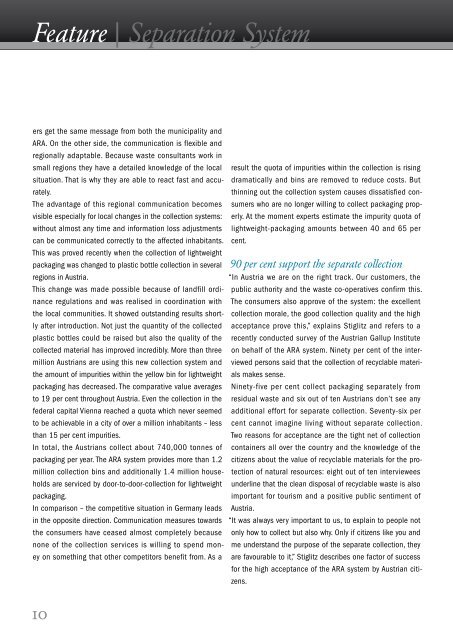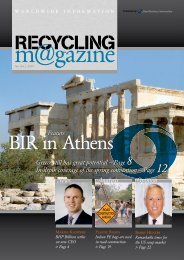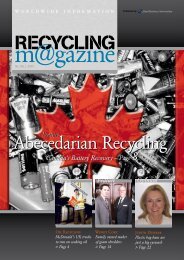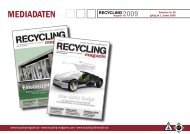please click here for the pdf-version - RECYCLING magazin
please click here for the pdf-version - RECYCLING magazin
please click here for the pdf-version - RECYCLING magazin
You also want an ePaper? Increase the reach of your titles
YUMPU automatically turns print PDFs into web optimized ePapers that Google loves.
Feature | Separation System<br />
ers get <strong>the</strong> same message from both <strong>the</strong> municipality and<br />
ARA. On <strong>the</strong> o<strong>the</strong>r side, <strong>the</strong> communication is flexible and<br />
regionally adaptable. Because waste consultants work in<br />
small regions <strong>the</strong>y have a detailed knowledge of <strong>the</strong> local<br />
situation. That is why <strong>the</strong>y are able to react fast and accurately.<br />
The advantage of this regional communication becomes<br />
visible especially <strong>for</strong> local changes in <strong>the</strong> collection systems:<br />
without almost any time and in<strong>for</strong>mation loss adjustments<br />
can be communicated correctly to <strong>the</strong> affected inhabitants.<br />
This was proved recently when <strong>the</strong> collection of lightweight<br />
packaging was changed to plastic bottle collection in several<br />
regions in Austria.<br />
This change was made possible because of landfill ordinance<br />
regulations and was realised in coordination with<br />
<strong>the</strong> local communities. It showed outstanding results shortly<br />
after introduction. Not just <strong>the</strong> quantity of <strong>the</strong> collected<br />
plastic bottles could be raised but also <strong>the</strong> quality of <strong>the</strong><br />
collected material has improved incredibly. More than three<br />
million Austrians are using this new collection system and<br />
<strong>the</strong> amount of impurities within <strong>the</strong> yellow bin <strong>for</strong> lightweight<br />
packaging has decreased. The comparative value averages<br />
to 19 per cent throughout Austria. Even <strong>the</strong> collection in <strong>the</strong><br />
federal capital Vienna reached a quota which never seemed<br />
to be achievable in a city of over a million inhabitants – less<br />
than 15 per cent impurities.<br />
In total, <strong>the</strong> Austrians collect about 740,000 tonnes of<br />
packaging per year. The ARA system provides more than 1.2<br />
million collection bins and additionally 1.4 million households<br />
are serviced by door-to-door-collection <strong>for</strong> lightweight<br />
packaging.<br />
In comparison – <strong>the</strong> competitive situation in Germany leads<br />
in <strong>the</strong> opposite direction. Communication measures towards<br />
<strong>the</strong> consumers have ceased almost completely because<br />
none of <strong>the</strong> collection services is willing to spend money<br />
on something that o<strong>the</strong>r competitors benefit from. As a<br />
10<br />
result <strong>the</strong> quota of impurities within <strong>the</strong> collection is rising<br />
dramatically and bins are removed to reduce costs. But<br />
thinning out <strong>the</strong> collection system causes dissatisfied consumers<br />
who are no longer willing to collect packaging properly.<br />
At <strong>the</strong> moment experts estimate <strong>the</strong> impurity quota of<br />
lightweight-packaging amounts between 40 and 65 per<br />
cent.<br />
90 per cent support <strong>the</strong> separate collection<br />
“In Austria we are on <strong>the</strong> right track. Our customers, <strong>the</strong><br />
public authority and <strong>the</strong> waste co-operatives confirm this.<br />
The consumers also approve of <strong>the</strong> system: <strong>the</strong> excellent<br />
collection morale, <strong>the</strong> good collection quality and <strong>the</strong> high<br />
acceptance prove this,” explains Stiglitz and refers to a<br />
recently conducted survey of <strong>the</strong> Austrian Gallup Institute<br />
on behalf of <strong>the</strong> ARA system. Ninety per cent of <strong>the</strong> interviewed<br />
persons said that <strong>the</strong> collection of recyclable materials<br />
makes sense.<br />
Ninety-five per cent collect packaging separately from<br />
residual waste and six out of ten Austrians don’t see any<br />
additional ef<strong>for</strong>t <strong>for</strong> separate collection. Seventy-six per<br />
cent cannot imagine living without separate collection.<br />
Two reasons <strong>for</strong> acceptance are <strong>the</strong> tight net of collection<br />
containers all over <strong>the</strong> country and <strong>the</strong> knowledge of <strong>the</strong><br />
citizens about <strong>the</strong> value of recyclable materials <strong>for</strong> <strong>the</strong> protection<br />
of natural resources: eight out of ten interviewees<br />
underline that <strong>the</strong> clean disposal of recyclable waste is also<br />
important <strong>for</strong> tourism and a positive public sentiment of<br />
Austria.<br />
“It was always very important to us, to explain to people not<br />
only how to collect but also why. Only if citizens like you and<br />
me understand <strong>the</strong> purpose of <strong>the</strong> separate collection, <strong>the</strong>y<br />
are favourable to it,” Stiglitz describes one factor of success<br />
<strong>for</strong> <strong>the</strong> high acceptance of <strong>the</strong> ARA system by Austrian citizens.





